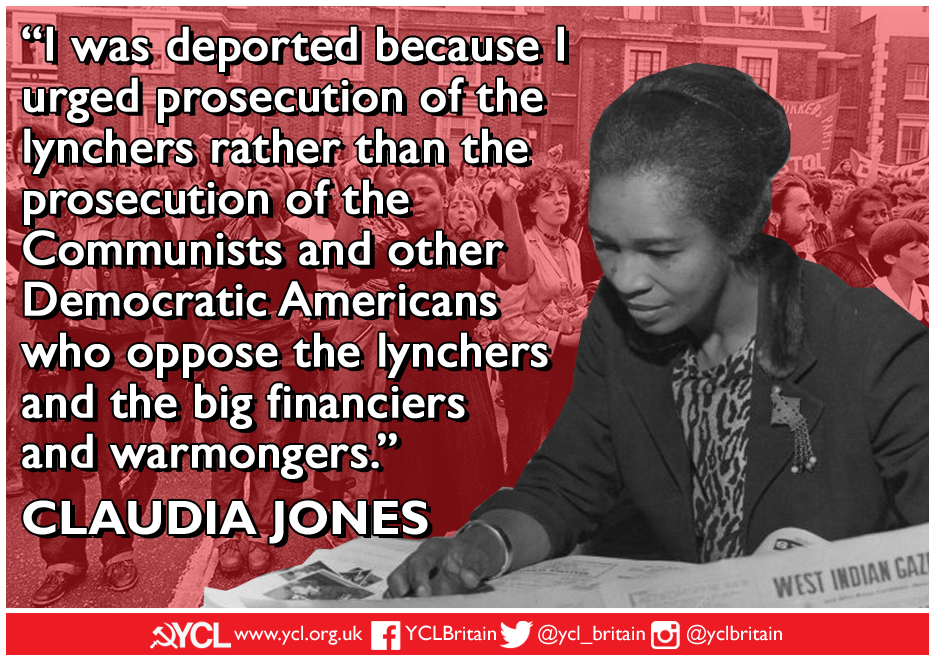 As part of a month long build up to International Women’s Day Celebrations on the 8th of March, the YCL will be publishing daily articles highlighting the exemplary role played by women in the international communist & working class movement.
As part of a month long build up to International Women’s Day Celebrations on the 8th of March, the YCL will be publishing daily articles highlighting the exemplary role played by women in the international communist & working class movement.
In this second instalment we discuss the legacy of Claudia Jones, born in Trinidad, veteran of the Communist Parties of the USA and Britain and Mother of the Notting Hill Carnival.
YCLers are encouraged to host, support and participate in celebrations locally to bring the message of International Women’s Day into Our workplaces, colleges and schools, and communities.
Claudia Jones was born in 1915 in Belmont, Port-of-Spain, Trinidad. Following the loss of the family fortune due to the post-war cocoa price crash, she was sent at the age of eight with her three sisters to join her parents in New York. Jones’ mother died five years later and, in the depression years, her father was fortunate to obtain work as the janitor of a run down apartment block in Harlem.
So wretched was their poverty that they could not afford the ‘graduation outfit’ to enable Claudia to receive the Roosevelt Award for Good Citizenship she had earned, and so damp was their apartment that her formal education was virtually ended in 1932 by the tuberculosis which irreparably damaged her lungs. That, with the added complication of severe heart disease, plagued her for the rest of her life.
For over 30 years she lived in New York and was an active member of the Communist Party of the United States of America (CPUSA). Like many black Americans, Jones was persuaded by the spirited defence by the Communist Party of nine African-American boys falsely convicted of rape in 1935 in Scottsboro, Alabama. She joined the Young Communist League, where her talents as a writer and organiser were soon recognised.
By 1948, Jones had been elected to the National Committee of the CPUSA, was the Editor for ‘Negro Affairs’ on the Daily Worker and had been arrested for the first time under threat of deportation to Trinidad. A much sought after speaker and advocate for peace and civil rights, she travelled widely in the United States but was arrested several times eventually being imprisoned for a year on trumped up charges of advocating the violent overthrow of the US government. While in prison her health deteriorated and in 1955 she was deported to Britain, much to the relief of the British colonial governor of Trinidad who had feared that she might “prove troublesome” had she been sent there.
She was given an affectionate send off by 350 friends and comrades led by her closest friends, the great black singer and actor Paul Robeson and his wife Essie. The British government refused her a full passport until 1962 in spite of representations from Trinidad’s first black Prime Minister, Dr Eric Williams, its white colonial governor having argued for restrictions on her freedom to travel to be maintained.
The British Communist Party naturally responded to requests from their American comrades to help Claudia Jones find a role but it was no simple matter to parachute her into a leadership role. Her cultural and political affinity was less Trinadadian than American. There was an underlying difference in the experience of the CPUSA, with a long-established black community engaged in an intensive liberation struggle, which contrasted sharply with that of Britain’s Communist Party, which was seeking in the late 1950s and early 1960s to establish an integrated relationship between newly established Commonwealth arrivals and the wider labour movement.
Questions related to forms of organisation of black and other `immigrant’ communities within the British Party. At the time there was discussion over separate black, Jewish, Indian and Cypriot branches or whether these members should be allocated to residential or workplace branches. Claudia Jones spent her remaining years working with London’s African-Caribbean community and she did this with extraordinary distinction.
In 1958, she founded and edited Britain’s first black weekly newspaper `The West Indian Gazette’. In response to the infamous 1958 Notting Hill `riots’, she began to organise Carnivals under the auspices of the `West Indian Gazette’, the prime purposes of which were “to present West Indian talent to the public, which at that time could not see Caribbean people as anything other than hewers of wood and drawers of water”. The programme for the first show in February 1959 clearly declared her intentions: “A part of the proceeds of this brochure are to assist the payment of fines of coloured and white youths involved in the Notting Hill events.”
In the final analysis, perhaps because of her greatness in the black American struggle, Claudia Jones was very a different person to other, mostly white, American Communists who found sanctuary in Britain, some of whom were married to British Communists, or forged stable personal links. Claudia Jones died in 1964 but her lasting legacy is undoubtedly the Notting Hill Carnival, leading to her being described as `the mother’ of the carnival.